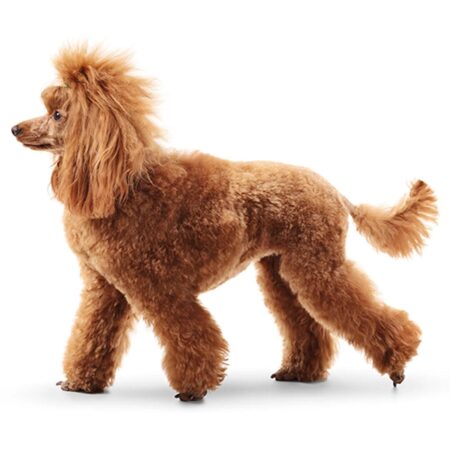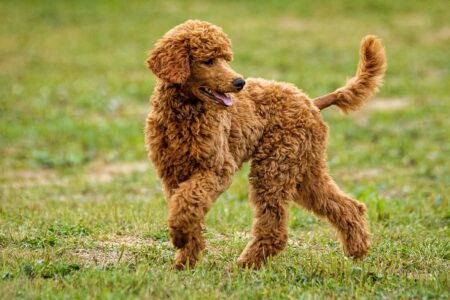
Apricot Standard Poodle: Ultimate Guide to the Perfect Family Dog
Apricot Standard Poodles are a popular dog breed known for their loving and affectionate personalities which makes them great companions for children and families alike. They are medium to large-sized dogs, standing up to 24 inches tall and weighing about 45 to 70 pounds. They are very popular in Germany as a hunting dog but their excellent traits have made them a favorite among families all over the world. With their signature fluffy coats in beautiful shades of apricot, these breeds are hard to miss and will turn heads wherever they go. Aside from their stunning looks, Apricot Standard Poodles are highly adaptable, making them suitable for various living situations. If you are looking for a loyal, intelligent, and stunning family dog then the Apricot Standard Poodle may be the perfect choice for you.
Apricot Standard Poodle: Overview
Apricot Standard Poodles are a breed of dog that was originally used for hunting and retrieving dogs and known for their distinctive apricot-colored coat and often have a friendly and playful personality.
Weight: Apricot Standard Poodles typically weigh between 45-70 pounds.
Height: The average height for an Apricot Standard Poodle is between 15-24 inches at the shoulder.
Lifespan: The average lifespan for an Apricot Standard Poodle is 12-15 years.
Exercise: These dogs have a moderate to high energy level and need daily exercise to keep them physically and mentally stimulated. This can include walks, runs, playtime, and even activities like agility training.
Grooming: The poodle’s curly coat requires regular grooming to prevent matting and tangling. This includes brushing at least 2-3 times a week and regular trips to the groomer for haircuts and trimming.
Training: Apricot Standard Poodles are highly intelligent and eager to please, making them relatively easy to train. They excel in activities such as obedience and agility training.
Temperament: These dogs are known for their friendly and outgoing personality, like they are also highly sociable and get along well with children, other pets, and strangers. They may have a strong hunting instinct and may try to chase smaller animals, so early socialization and training are essential. Overall, they make excellent family dogs due to their loyal and loving nature.
Are Apricot Poodles Hypoallergenic?
Yes, apricot poodles are hypoallergenic. Hypoallergenic means that the dog’s coat produces little to no dander, which is the main trigger for allergies in humans. Poodles, including apricot poodles, have a single coat of dense, curly hair that sheds minimally and produces less dander than other breeds which makes them a good choice for people with allergies.
What Causes Darker Red Hair In One Spot On An Apricot Poodle?
There could be a few possible explanations for darker red hair in one spot on an apricot poodle:
- Genetics: Poodles come in a variety of colors, including apricot. However, within each color, there can be variations and patterns. The darker red spot may be a result of a genetic variation within the apricot color.
- Sun Exposure: Just like humans, dogs can also experience changes in hair color due to sun exposure. If your poodle spends a lot of time in the sun, the hair in that specific spot may have been lightened or darkened by the sun’s rays.
- Skin Inflammation: If the darker red spot is accompanied by redness and irritation, it could be a sign of skin inflammation. This can be caused by allergies, insect bites, or other skin irritants.
- Trauma: If the poodle experienced trauma to that specific area, it could have caused changes in the hair color. This trauma could be from an injury, infection, or excessive scratching.
- Nutritional Deficiency: A lack of certain vitamins and minerals in a dog’s diet can lead to changes in hair color and texture. If your poodle is not getting enough of these essential nutrients, it could result in a darker red spot in their coat.
Do Apricot Poodles Become Lighter Over Time?
Yes, the shade may appear to lighten or darken depending on coat care and exposure to sunlight.
History of Apricot Standard Poodle
The apricot standard poodle is a color variation of the standard poodle breed. The standard poodle itself has a long and storied history, with origins dating back to at least the 15th century in Germany as a water retriever for hunters, thanks to its high intelligence and natural swimming abilities.
Poodle comes from the German word “pudel,” which means to splash. This name is fitting to this breed because of its dense, curly coat that is well-suited for swimming. However, the exact origins of the breed are somewhat debated. Some believe that the breed descends from the ancient Asian herding dog, while others believe it comes from the now-extinct French Barbet.
During the 18th and 19th centuries, the standard poodle was popularized and refined by the French aristocracy. The breed was often seen in elaborate, decorative grooming styles and was used as a companion and watchdog for wealthy families.
In the early 1900s, the poodle was recognized by the American Kennel Club (AKC) as a breed and was separated into three size categories: standard, miniature, and toy. The standard poodle has remained a popular breed in the United States ever since, consistently ranking in the top 10 most popular breeds according to AKC registration statistics.
The apricot color variation of the standard poodle has also been around for many years. It is believed to have originated from a red gene mutation in the breed, resulting in a lighter, apricot-colored coat. Apricot poodles were recognized by the AKC in 1898 and are still a popular color variation today.
SEE ALSO: 100 Weird Cat Behaviors and Their Meaning
Characteristics of Apricot Standard Poodle
- Color: The standard color of an apricot poodle is a soft, warm apricot hue. This color can range from light to dark and may have different tones of red or gold mixed in.
- Coat: Apricot standard poodles have a dense, curly coat that is soft to the touch. This coat is non-shedding and hypoallergenic, making it a good choice for people with allergies.
- Size: As the name suggests, apricot standard poodles are a larger size of poodle, measuring 15-20 inches at the shoulder and weighing between 45-70 pounds.
- Temperament: Standard poodles, including apricots, are known for their intelligent and friendly nature. They are often described as playful, loyal, and highly trainable.
- Health: With a lifespan of 10-12 years, apricot standard poodles are generally a healthy breed. However, they may be prone to certain health issues such as hip dysplasia, eye problems, and skin allergies.
- Exercise needs: These dogs have moderate exercise needs and require daily walks and playtime to keep them mentally and physically stimulated. They also make good companions for outdoor activities such as hiking and swimming.
- Grooming requirements: The curly coat of an apricot standard poodle requires regular grooming to prevent matting and keep it looking healthy. This includes brushing several times a week and regular visits to a professional groomer every 4-6 weeks.
- Versatility: Standard poodles, including apricots, are extremely versatile dogs and excel in various fields such as agility, obedience, and hunting. They also make excellent therapy dogs and can be trained for various tasks.
- Family-friendly: Due to their friendly and affectionate nature, apricot standard poodles make great family pets. They are good with children and other pets and thrive in a loving and active household.
- Distinctive appearance: The unique color and curly coat of apricot standard poodles make them stand out from other breeds. They are often described as elegant and regal in appearance, with a proud and alert expression.
Cost of Apricot Standard Poodle
The cost of an Apricot Standard Poodle can vary greatly depending on where you purchase the dog from, the breeder’s reputation, and the dog’s pedigree. On average, you can expect to pay anywhere from $1,500 to $4,000 for an Apricot Standard Poodle. However, prices can go even higher for show-quality dogs or those with a prestigious bloodline.
Health Issues of Apricot Standard Poodle
- Obesity: Standard Poodles, like many other large breeds, are prone to obesity if not provided with proper diet and exercise. Feeding a calorie-dense diet can lead to rapid weight gain, putting strain on their joints and increasing their risk of developing other health issues such as heart disease and diabetes.
- Hip dysplasia: This is a common skeletal disorder in large dog breeds, including Standard Poodles that is characterized by abnormal development of the hip joint, causing pain and difficulty in movement. It is believed to have a genetic component, so it is important to ensure that the parents of a Standard Poodle have been screened for hip dysplasia before breeding.
- Eye problems: Poodles can be prone to various eye issues, including cataracts, progressive retinal atrophy, and glaucoma. These can lead to vision impairment or even blindness if left untreated.
- Ear infections: Poodles have long, floppy ears that can trap moisture, dirt, and debris, making them prone to ear infections. Regular cleaning and grooming of their ears can help prevent this health issue.
- Addison’s disease: This is a hormonal disorder caused by the deficiency of the adrenal gland hormones, leading to symptoms such as lethargy, vomiting, and weight loss. Standard Poodles are at an increased risk of developing this condition, and it requires lifelong management with medication and regular vet checkups.
- Allergies: Just like humans, Poodles can also develop allergies to various environmental triggers such as pollen, dust, or certain foods. Symptoms may include itching, redness, and skin irritations, and can usually be managed with medication and avoidance of allergens.
- Bloat: Also known as Gastric Dilatation-Volvulus (GDV), bloat is a serious and potentially life-threatening condition that can affect Standard Poodles. It occurs when the stomach fills with gas, twists, and cuts off blood supply, leading to tissue death. Symptoms include restlessness, bloating of the abdomen, and unproductive retching, and it requires immediate medical attention.
- Thyroid problems: Standard Poodles can develop hypothyroidism, a condition where the thyroid gland does not produce enough hormones. which can cause various symptoms, including weight gain, sluggishness, and skin problems, and can easily be managed with medication.
- Joint problems: Due to their size and structure, Standard Poodles are prone to joint problems such as patellar luxation (when the kneecap slips out of place) and arthritis. Proper exercise, weight management, and regular vet checkups can help prevent or manage these issues.
- Dental problems: Poodles are prone to plaque and tartar buildup, which can lead to gum disease, tooth decay, and tooth loss. Regular teeth brushing and professional dental cleanings are important for maintaining good oral hygiene in Standard Poodles.
How to Care for Apricot Standard Poodle
- Grooming: Apricot standard poodles have a thick, curly, and low-shedding coat that requires regular grooming. Brush your dog’s coat at least two to three times a week to prevent matting and tangles. Use a slicker brush or a metal comb to gently remove any debris or tangles. Trim the hair around the eyes, ears, and paws to keep them clean and prevent irritation.
- Bathing: Apricot standard poodles only need to be bathed when necessary, as frequent bathing can strip their coat of natural oils. Use a mild dog shampoo and lukewarm water to wash your dog. Thoroughly rinse off all soap residue to avoid skin irritation. After bathing, gently pat your dog’s coat dry with a towel.
- Nail Care: Keep your apricot standard poodle’s nails trimmed to a comfortable length. Overgrown nails can be painful and make it difficult for your dog to walk. If your dog’s nails are clear, you can easily see the quick (the pink part inside the nail) and avoid cutting into it. If your dog has dark nails, seek the help of a professional groomer to trim them safely.
- Exercise: Apricot standard poodles are an active and energetic breed that needs regular exercise to stay healthy and mentally stimulated. Aim for at least 30 minutes of exercise per day, such as brisk walks, playing fetch, or agility training. This will also help prevent behavioral issues that can arise from boredom and lack of exercise.
- Dental Care: Dental hygiene is essential for apricot standard poodles as they can be prone to dental problems. Brush your dog’s teeth at least three times a week using a dog-specific toothpaste. You can also provide dental chews and toys to help keep their teeth clean and healthy.
- Nutrition: A high-quality diet is crucial for the health and well-being of your apricot standard poodle. Choose a food that is specifically formulated for standard poodles, considering their size, age, and activity level. Consult with your veterinarian for recommendations on the best diet for your dog.
- Regular Vet Visits: Schedule regular check-ups with your veterinarian to ensure your apricot standard poodle’s overall health. They will be able to detect any health issues early on and provide appropriate treatment. Additionally, make sure your dog is up to date on all necessary vaccinations and parasite prevention.
Diets of Apricot Standard Poodle
- Lean proteins such as chicken, turkey, and fish
- Sweet potatoes
- Brown rice
- Pumpkin
- Yogurt
- Green beans
- Carrots
- Apples
- Blueberries
- Spinach
- Broccoli
- Quinoa
- Cottage cheese
- Salmon
- Eggs
- Oatmeal
- Liver
- Coconut oil
- Peanut butter (in moderation)
- Natural or organic kibble and wet food made specifically for poodles.
Standard Apricot Poodle Dog Names
- Sunny
- Apricot
- Peach
- Goldie
- Rusty
- Ginger
- Blaze
- Cinnamon
- Amber
- Honey
- Biscuit
- Marigold
- Nugget
- Buttercup
- Papaya
- Carmel
- Tawny
- Fawn
- Blondie
- Tangerine
SEE ALSO: All You Need To Know About Mini Bernese Mountain Dog
FAQs
Q. Is a standard poodle a good family dog?
Yes, standard poodles are generally considered to be good family dogs. They are intelligent, friendly, and social dogs that can do well with children and other pets if properly socialized and trained.
Q. What is the temperament of an apricot Poodle?
The temperament of an apricot Poodle is typically described as affectionate, intelligent, and playful. They are loving and devoted companions who are always eager to please their owners.
Q. What is the rarest color of a Poodle?
The rarest color of a Poodle is thought to be the shiny black coat known as “phantom” or “phantom sable”. This coat color has a black base with distinctive tan or silver markings on the legs, chest, and face. It is not recognized by the American Kennel Club (AKC) standard for Poodles but can occasionally occur in certain bloodlines.
Q. Why are apricot Poodles so rare?
Apricot Poodles are considered rare because the apricot color is not common in Poodles. Most Poodles are either black, white, or shades of brown, so the apricot color is less commonly seen.


